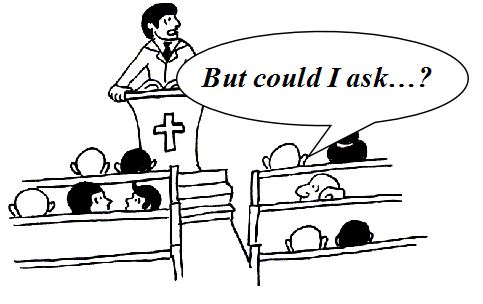 Related Articles
Related Articles
|
|
|
|
|
Q&A sessions after Sunday sermons?
The apostle Paul advised his audience to 'check him out'. Surely contemporary preaching should be subject to the same scrutiny?
Now the Bereans were of more noble character than the Thessalonians, for they received the message with great eagerness and examined the Scriptures every day to see if what Paul said was true. (Acts 17:11)
 In most churches Sunday sermons are listened to in silence. At the end of the peroration, and after a singing and the benediction the formal part of the service comes to an end. 'Audience participation' is not part of the established pattern. In most churches Sunday sermons are listened to in silence. At the end of the peroration, and after a singing and the benediction the formal part of the service comes to an end. 'Audience participation' is not part of the established pattern.
Back in the dark ages of biblical illiteracy those in the pews either didn't have Bibles or couldn't read what was written in the sacred pages. Even today to utter a spontaneous and affirmative 'Hallelujah!' during the course of a sermon can attract disapproving responses.
There are very few churches which even possess a box into which members can 'post' written questions (for subsequent response).
Yet we see in other situations - whether it be training seminars, presentation, discussion groups, TV chat shows ample opportunity for feedback, responses and 'Q&A' sessions.
Commenting elsewhere in this website a site member (Seumas, Tobermory) stated:
 "I feel that churches should have public question and answer sessions at the end of every sermon. In any other walk of life where a subject, a topic, a seminar or a presentation was being given, Q &A at the end would be expected. "I feel that churches should have public question and answer sessions at the end of every sermon. In any other walk of life where a subject, a topic, a seminar or a presentation was being given, Q &A at the end would be expected.
Preachers seem to be free of this requirement to justify what they have just [preached].
And after all , if it is the "truth" they give forth, they should have no difficulty in answering the questions, should they....?)"
In the course of sound Bible teaching, the Holy Spirit will be at work stimulating the hearts and minds of all who are looking to hear from the Lord. And yet congregations file out of the church door with their questions unanswered.
Meanwhile there is another – even greater – problem.
When his disciples asked Jesus what would be the signs prreceding his return, the first things he spoke about was deception, the rise in deception, and the need to guard against it. (Matt 24: 4 -5, 11, 24; 1 Tim. 4:1; 2 Tim 3:13). We are living in days when false teaching abounds and traditions and theologies preached which cannot be biblically supported.
Has the time come to offer otherwise passive church 'audiences' the means and opportunity to address questions to preachers? Answers need not be on a postcard.
Footnote: In our courts of law witnesses are asked to tell: 'The truth; the whole truth; and nothing but the truth'. Anything less than that can constitute a lie. There are many theologies and traditions which have distorted the word of God by omission; failing to teach on and from the whole counsel of God.
See 'What we are not hearing from God's Word'. |
Christians Together, 18/01/2013
|
|
|
|